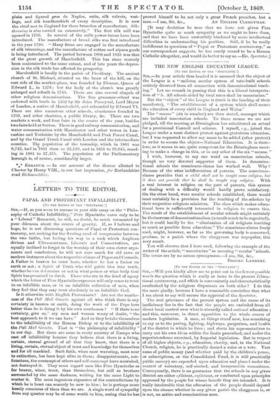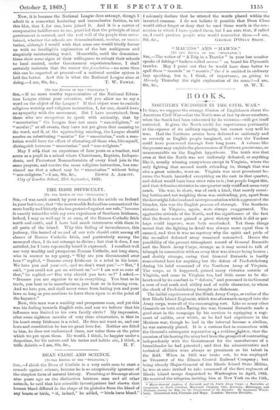[TO THE EDITOR OF THE SPECTATOR.]
you kindly allow me to point out in the fewest possible words the question which is really at issue in the present Educa- tional controversy, and which is conveniently and characteristically overlooked by the religious disputants on both sides ? I do this the more gladly, because I have a reasonable conviction that what I am about to say will secure the approval of the Spectator.
The real grievance of the present system and the cause of its inefficiency lies in the fact that the people are excluded from all direct local control over what is absurdly called national education ; and this, moreover, in direct opposition to the whole course of modern legislation. A man, as things stantnow, has something to say as to the paving, lighting, highways, pauperism, and health of the district in which he lives ; and elects his representatives to carry out his own ideas within the limits prescribed, and under the superintendence exercised, by Imperial legislation. But in respect of all higher objects, e.g., education, charity, and, in the National Church, religion, he is practically denied a voice or a vote. Vast sums of public money (and whether paid by the children's pence, or subscriptions, or the Consolidated Fund, it is still practically public money) are expended upon education and placed under the control of voluntary, self-elected, and irresponsible committees. Consequently, there is no guarantee that the schools in any given district are either efficient, sufficient, or conducted upon principles approved by the people for whose benefit they are intended. It is really intolerable that the education of the people should depend upon the chance whether in any given parish the clergyman is, or is not, an active and conscientious man. Now, it is because the National League does attempt, though I admit in a somewhat hesitating and inconclusive fashion, to hit this blot, that I, for one, have joined it. And it is a matter of comparative indifference to me, provided that the principle of local government is secured, and the real will of the people thus ascer- tained, whether the schools are denominational, secular, or unsee- tarian, although I would wish that some one would kindly favour us with an intelligible explanation of the last ambiguous and singularly uninteresting word. Meanwhile, until the denomina- tions show some signs of their willingness to submit their schools to local control, under Government superintendence, I shall certainly maintain that the sooner the foundation —no more than this can be expected at present—of a national secular system is laid the better. And this is what the National League aims at































 Previous page
Previous page